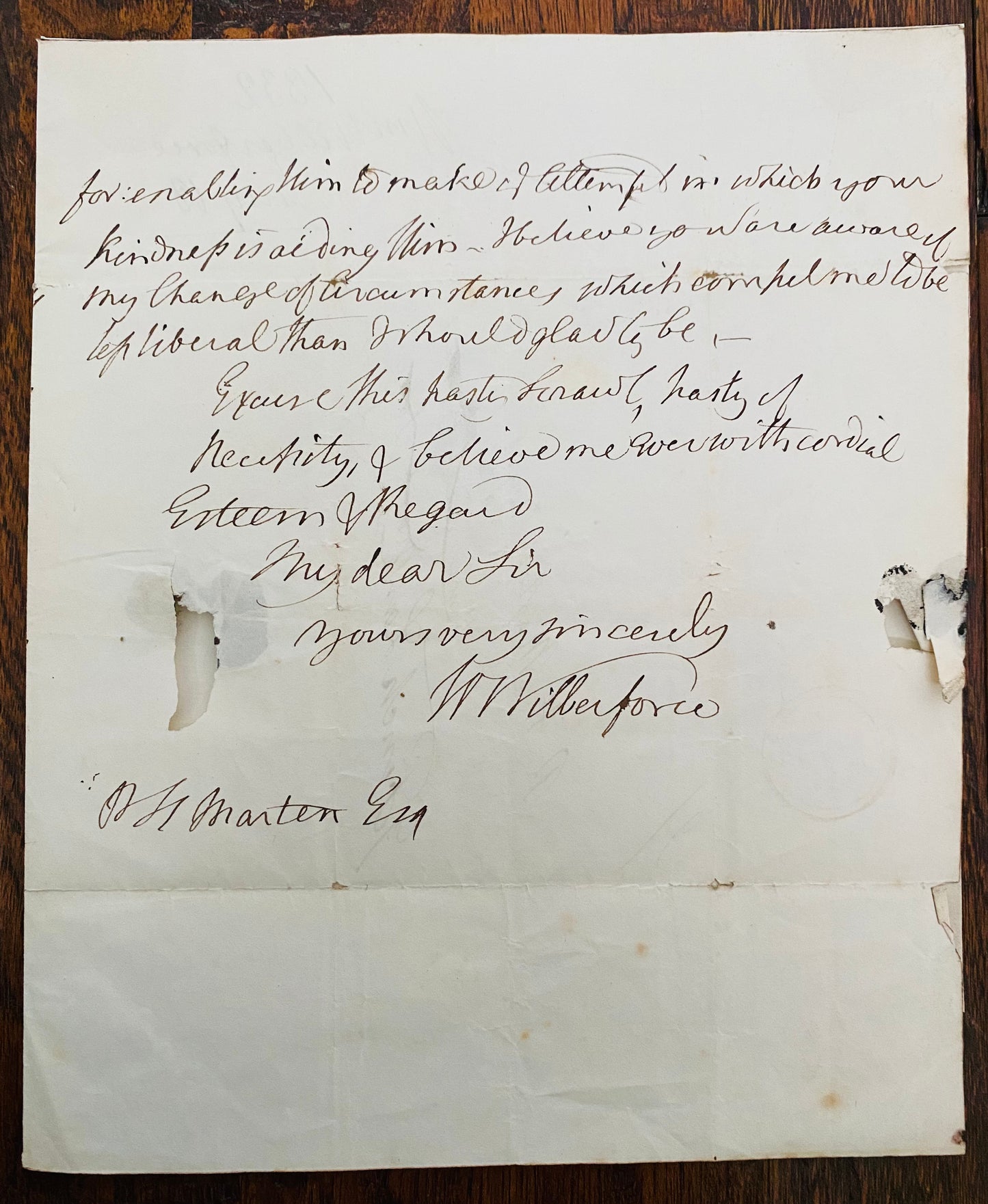Specs Fine Books
1832 WILLIAM WILBERFORCE. Autograph Letter to Fellow Abolitionist and Friend, Robert Humphrey Marten.
1832 WILLIAM WILBERFORCE. Autograph Letter to Fellow Abolitionist and Friend, Robert Humphrey Marten.
Couldn't load pickup availability
We sold one other letter from Wilberforce to his friend, R. H. Marten last year, and have no had another come to us from the family.
A lovely example of a Wilberforce letter, entirely in his hand, addressed to Robert Humphrey Marten [1763- 1839]. Marten grew and and lived at Broadway House in London, where Wilberforce often visited. Elizabeth Fry, Quaker abolitionist lived right down the road. As a fellow MP with Wilberforce, he was deeply engaged in the fight for the abolition of slavery and other causes associated with social reforms that benefited children, women, immigrants, and slaves. He also personally financed the founding of the non-conformist church at Plaistow.
Marten was also deeply interested in the work of abolition in the United States. He corresponded frequently with the Christian Herald in New York and would relate news of Wilberforce's doings, messages to the Christian Herald and America from Wilberforce, etc., [see, for example, September 1, 1821's Correspondence section].
In this wonderful, lengthy 3pp letter, we have Wilberforce writing to Marten regarding a mutual young friend whom Wilberforce is attempting to settle in London, which "we all know but too well the temptations to which young men in London must be subject and prey when they have nothing to do." Wilberforce refers to him as his "protégé." The precise identity of said person is well worth chasing down and likely attainable. Wilberforce did mentor many young men over the years, including George Thompson and other abolitionists and rights-centric MP's, etc.
"Private
Missenden, July 18th, 1832
My dear Sir,
I am ashamed that from accidental hindrances there should be any delay in my replying to a friend who is so kindly attending to a concern on my application.
I think you cordially for the pains you have taken to obtain a berth for my young protégé. I will desire messrs Smith to pay you 5l out of which be so oblinging as to repay yourself the 30s you have advanced for him. I am a little anxious what I should do for him in the pecuniary way. I sent him 5l before he came up to town & I hoped that would suffice for him. You can judge much better than myself what he ought to spend. He certainly should be as economical as possible. Indeed, considerations still more important than the money's worth enforce the duty of economy. We know but too well the temptations to which young men in London must be subject, especially when they have nothing to do. I can truly say it would on that account as well as on others be a great relief to me to hear that you had succeeded in your kind endeavour to procure him any situation afloat. If not a better at first, that might follow if should prove himself in an inferior station to deserve confidence. He has this day written to me implying that his money is all gone, but not at all saying how it has been spent. Let me beg you to give him out of the 3l 10s that will remain after paying yourself whatever you think right. I wish you would be so kind as to endeavour to ascertain how he is going on and to impress on him the absolute necessity of being as frugal as possible. Indeed I cannot undertake to supply him with more than is absolutely [necessary] for enabling him to make the attempt in which your kindness is aiding him. I believe you are aware of my change of circumstances which compel me to be less liberal than I should gladly be.
Excuse this hasty scrawl, partly of necessity & believe me ever with cordial Esteem and Regard
My dear Sir
Yours very sincerely
WWilberforce."
An important feature of this letter; by this time, Wilberforce was writing almost none of his own correspondence. He had retired from the House of Commons in 1825 and moved to his home at Highwood Hill, north of London. It was a sprawling estate with 140 acres of land and many smaller cottages. His eyesight problems were especially acute by this time and nearly all correspondence handled by an amanuensis.
Three pages, last page affixed onto album page, small loss due to wax seal removal, folding marks not impacting legibility. Dated Missenden, 18 July 1832, just one year to the month before his death in July of 1833.
Generally finely preserved and unpublished.
Share






